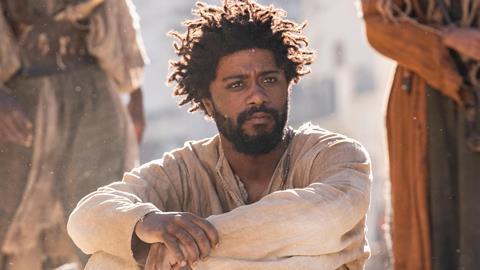The Book of Clarence isn’t a Jesus-parody. It’s the tale of a grifter who decides to go into the Messiah business with unexpected consequences. But is it meant to be a comedy or a social commentary? Giles Gough isn’t quite sure

As Monty Python learned in 1979, Christians tend to be wary (to say the least) of any film that could be construed as a parody of the life of Jesus. So, for those of you who are uncertain, let me put your mind at ease: Jesus is in this film, he is the son of God and he demonstrably works miracles. The depiction of Jesus is in no way blasphemous and yet, the 15-certificate given to this film is probably the best clue that it may not be for everyone.
Mary Magdalene: Chariot racer
The film opens with Clarence (played by Lakeith Stanfield) losing a fast-paced chariot race through Jerusalem to (of all people) Mary Magdalene. With the prize money and the chariot lost, Clarence and his best friend Elijah are now in deep with the local crime boss who loaned them the vehicle.
After a series of trials, Clarence decides that the best way to earn money fast is to set himself up as a false messiah, performing ‘miracles’ on plants in the crowd and preaching his message that knowledge is stronger than belief. After all, as Clarence asks: “You ever seen Jesus buy a pair of sandals?”
The Book of Clarence is what you would get if Spike Lee had directed The Life of Brian
Whilst this film is not without it’s laugh out loud moments, it’s sometimes difficult to work out exactly what it wants to be. On the one hand, it’s a light-hearted, delightfully irreverent comedy. On the other, it’s an excoriating commentary on colonialism, spiritual abuse and oppression. With the narrative being pulled in both directions at the same time, the laughs are perhaps not as frequent as they should be and the social commentary doesn’t have the room it needs to breathe.
All that said, there is a lot to like. Stanfield is on form with his laconic portrayal of a grifter with a heart of gold. Having starred in Boots Riley’s 2018 Sorry To Bother You - which took on capitalism in a similar way – it’s not difficult to see what drew him to this project. Essentially, The Book of Clarence is what you would get if Spike Lee had directed The Life of Brian.
The cast list is an embarrassment of riches. Omar Sy as Barabbas, the gladiator Clarence frees, is eminently watchable. Alfre Woodard’s Mother Mary delivers the fantastic line: “I was minding my own virgin business just being a virgin”. James McAvoy is clearly having a great time as Pontius Pilate and Nicholas Pinnock is everything you need him to be as Jesus: quiet, calm and loving, if not super memorable.
Putting people of colour back into the New Testament
The choice to have a virtually all Black cast puts a refreshing spin on a time and place so many believers have a clear picture of in their minds. Any critics who complain about Jesus being Black can’t be taken seriously unless they have made similar complaints about Robert Powell, Jim Caviezel and Joaquin Phoenix playing the Messiah while being white. It’s an artistic choice, and it works in this film.
The talent on-screen is mirrored by the talent off-screen. Jeymes Samuel wrote, directed and produced the film, and as if that weren’t enough, he also created the original score for the soundtrack. Jay-Z is also credited as a producer, telling the Associated Press at the premiere: “We putting ourselves in the New Testament, as we should be.”
The musical numbers may well remind the viewer of Baz Luhrmann’s 2013 adaptation of The Great Gatsby, which shunned jazz on the soundtrack in favour of hip hop to give us a better idea of how that time felt rather than how it literally was.
Jesus is in this film, he is the son of God and he demonstrably works miracles
Even though this film may not fully land with audiences, there are still some moments that stay with you days after seeing it. As one character is forced to drag his own cross through the streets, his mother yells out: “They always take our babies!”
In doing so, this concisely links the oppression the Jews felt in first century Israel to the vast scale of Black people wrongfully killed by the police. It’s a great message, even if it does get a bit buried.
Ultimately, this is an uplifting film that leaves you with the message that God’s mercy is for everyone. He is as likely to perform miracles for a fake messiah as he is for the most devout follower.





































No comments yet